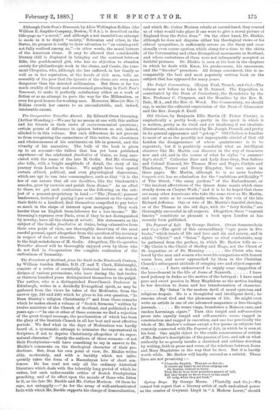The Pageant of Life. By George Barlow. (Swan Sonnenschein and
Co.)—The spirit of this extraordinary "epic poem in five books," which treats of life and love and sin and misery, and in which "Christ" and " Satan " figure as rival combatants, may be gathered from the preface, in which Mr. Barlow tells us :— "My Christ is the Christ of Shelley and Hugo, not the Christ of
St. Augustine or of Dr. Manning the Christ who was loved by the men and women who were his companions with honest warm love, and never approached by them in the Christian Church's subsequent attitude of cringing awe and abject supersti-
tion I have endeavoured to supply some suggestion of e-
the lovelement in the life of Jesus of Nazareth I have used jealousy in Judas as the motive of the betrayal : I have used pure and sweet passion in Mary Magdalene as the motive leading to her devotion to Jesus and her transformation of character.
My ' Satan ' is the modern devil of moral cynicism and religious despair. He is a thoughtful and intelligent devil ; he reasons about God and the phenomena of life. He might even write an article in one of our advanced magazines or free-thought
journals He wears rings, brandishes a Malacca cane, and smokes Larraiiaga cigars." Turn this turgid and self-assertive prose into equally turgid and self-assertive verse, rugged in construction and ragged in execution, and one has practically the- whole of Mr. Barlow's volume except a few poems on subjects but remotely connected with The Pageant of Life, in which he is seen at his best. One might object to the crude sensuousness of certain of Mr. Barlovr's descriptions of the passion of love, and ask on what authority he so grossly insults a cherished and sublime devotion by writing, both in prose and verse, of the relations between Jesus and Mary Magdalene in the way that he does. But it is hardly worth while. Mr. Barlow will hardly succeed as a satirist. These lines are not promising :— .‘ I lova the English. They are so devout ;
It cheers my heart to see them sallying out On Sunday. clothed in black. They like to hear their preachers preach of hell, Bat they forget its fierce fames in the smell Of soup, when they get back."


































 Previous page
Previous page